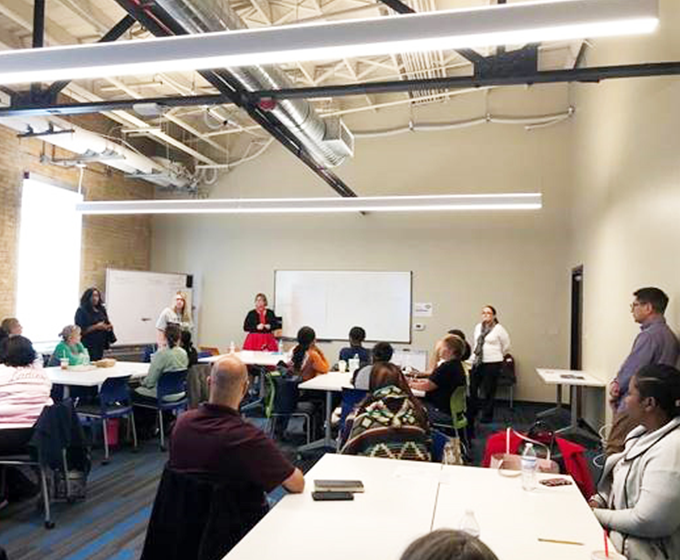
Dec. 12, 2019 — Researchers in the UTSA College of Public Policy, assistant professor of social work Jelena Todic and criminal justice lecturer and restorative justice coordinator Robert Rico are joining forces with Up Partnership and three local school districts in a collaborative applied research project to rethink discipline in San Antonio schools.
The UTSA team is assisting Up Partnership with Rethinking Discipline Community of Practice implementation and process evaluation. The project, funded by the Strive Together Promising Practice Fund grant, is one of the My Brother’s Keeper San Antonio collaborative initiatives.
Up Partnership, a nonprofit and community-based organization that facilitates the MBKSA, is dedicated to ensuring that “all young people across Bexar County are ready for the future.” My Brother’s Keeper San Antonio is a network of cross sector partners, including UTSA, working together to change outcomes for boys and young men of color.
The Rethinking Discipline Community of Practice, which includes nine elementary, middle and high schools in San Antonio from Harlandale, Judson and San Antonio ISDs, is just one of the many initiatives aiming to reach this goal.
The Community of Practice aims to introduce, scale and accelerate implementation of restorative practices in San Antonio schools. Evidence indicates that school-based restorative justice can increase students’ sense of school connectedness and decrease suspensions/expulsions, ultimately increasing graduation rates and interrupting school-to-prison pipeline.
Rooted in the practices of the indigenous people of North America and New Zealand and the peace philosophy of the U.S. Mennonite community, restorative justice seeks to involve all impacted by wrongdoing to collectively repair harms and make things right. Any misconduct is a violation of people and relationships rather than a violation of the law or school rules. As a result, violations create obligations to address the needs of those who experienced harm, those responsible for harm, and the community.
Providing an opportunity for those most directly impacted by the harm to be involved in responding to and repairing the harm is a central feature of the restorative process. Ultimately, restorative justice is a relational process that integrates support with accountability.
The research team, which also includes an M.S.W. student, Norma Almazan, has been collecting quantitative and qualitative implementation process data, using it to inform monthly capacity building and problem solving sessions.
The final process evaluation report, due Feb. 1, 2020, will identify implementation facilitators and barriers and evaluate the local implementation efforts against the recommended best practices. The research team hopes the report will assist the local schools, districts and Up Partnership in ongoing strategic planning, resource allocation, and funding efforts.
Connect with UTSA online at Facebook, Twitter, YouTube, Instagram and LinkedIn.
UTSA Today is produced by University Communications and Marketing, the official news source of The University of Texas at San Antonio. Send your feedback to news@utsa.edu. Keep up-to-date on UTSA news by visiting UTSA Today. Connect with UTSA online at Facebook, Twitter, Youtube and Instagram.
Move In To COLFA is strongly recommended for new students in COLFA. It gives you the chance to learn about the Student Success Center, campus resources and meet new friends!
Academic Classroom: Lecture Hall (MH 2.01.10,) McKinney Humanities BldgWe invite you to join us for Birds Up! Downtown, an exciting welcome back event designed to connect students with the different departments at the Downtown Campus. Students will have the opportunity to learn about some of the departments on campus, gain access to different resources, and collect some giveaways!
Bill Miller PlazaCome and celebrate this year's homecoming at the Downtown Campus with food, games, giveaways, music, and more. We look forward to seeing your Roadrunner Spirit!
Bill Miller PlazaThe University of Texas at San Antonio is dedicated to the advancement of knowledge through research and discovery, teaching and learning, community engagement and public service. As an institution of access and excellence, UTSA embraces multicultural traditions and serves as a center for intellectual and creative resources as well as a catalyst for socioeconomic development and the commercialization of intellectual property - for Texas, the nation and the world.
To be a premier public research university, providing access to educational excellence and preparing citizen leaders for the global environment.
We encourage an environment of dialogue and discovery, where integrity, excellence, respect, collaboration and innovation are fostered.